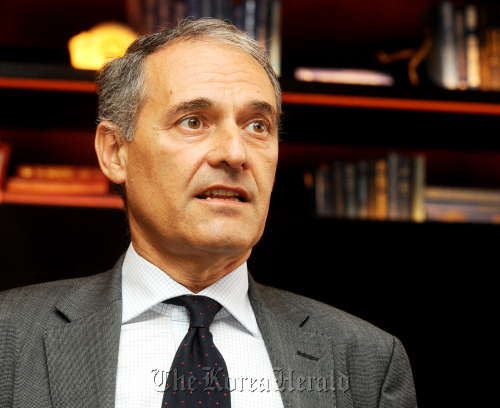EU expert says international network can help return cultural properties to rightful homes
Outside of a crime or conviction, the only way to prompt the return of cultural properties is to negotiate, said Manlio Frigo, professor of European Union and international law at Italy’s University of Milan.
Frigo visited Seoul to participate in a forum on the return of cultural property with other world-leading academics in the field, which took place on Tuesday at Plaza Hotel in central Seoul.
To commemorate recent diplomatic achievements including the repatriation of Korean books from France and Japan, and to establish strategies for the return of more Korean cultural assets scattered throughout the world, the Foreign Ministry co-hosted the forum with the Cultural Heritage Administration and the Korean National Commission for UNESCO.
“Every community has the right to know its past and know the cultural remains. So there is a cultural right to have the objects back,” he said in an interview with The Korea Herald ahead of the forum.
 |
Manlio Frigo, professor of EU and International Law at the University of Milan, speaks during an interview with The Korea Herald, on Tuesday in Seoul. (Park Hyun-koo/The Korea Herald) |
Frigo said that Italy is in a particular position regarding the issue, as the country has both looted and been looted from in the past. He agreed with the general approach of the Italian government ― to fight against illicit trafficking of cultural properties ― and added that it is not easy work because there are so many debatable factors.
“First, it is very debatable when international customary laws exist, as far as the principle of returning the cultural objects to the country of origin is concerned. Second, it is often difficult to individuate which is the country of origin. Also there is the question of how far are we supposed to go to give back objects. What about the legitimate possessor of the object? So numerous problems that are to be faced are really relevant,” said the Italian professor.
The “heart of the problem” is when domestic laws of different countries or those and museum regulations clash, he said, and emphasized the importance of international cooperation, building an international network trying to be more flexible as a way out.
“From 2006 to 2009, Italy executed a number of agreements with international museums like the Getty Museum, the Metropolitan Museum of Art and Cleveland Museum. With these agreements, Italy restituted a number of important objects of doubtful origins that have been bought by these museums,” he said.
He gave an example of a recent negotiation between Italy’s Culture Ministry and the Cleveland Museum governed by international law, which resulted in the return of 14 artifacts the U.S. museum to the European country. The museum first wanted evidence that the requested items were illicitly exported, but later provided documents it had, understanding that the difficulty of finding evidence of illegally excavated items which were not even recorded. Both sides got the best results they wished for, said Frigo.
“At the end, we reached an agreement of, let’s say, 20 (out of 100) items to be returned because we were quite sure that they came from Italy and were illicitly excavated. It was a double result ― the government was happy to say to its people that we have brought back 20 important archeological objects of our history, and the museum was happy to show clearly to the world that they were acting in good faith and that they are not supporting illicit excavation, looting and trafficking of art.”
It may have been an easier case, as several criminal trials regarding museums’ trafficked objects were ongoing. Many museums were willing to cooperate and prove that they have not taken part any form of illegal acts. But in most times museums are stiffer.
“When countries ask important museums in the world to return some objects, often the answer is, ‘Why should we give back an object we bought legally from the market years ago?’ Of course there is a cultural right to have these objects back but facing reality, you have to take into consideration these regulations as well because they are often very legitimately based,” he said.
In such cases, loans can be an alternative, on the premise that domestic laws are sufficiently flexible enough. Frigo mentioned the recent reform of the Italian code of cultural property which enabled the Culture Ministry of Italy to loan items to other countries. He also said the return of Korean royal books from France on loan was another optimistic sign of finding solutions that could satisfy both parties.
Frigo added that establishing and respecting codes of ethics by individual institutes, like those elaborated by the International Council of Museums, is important as well.
“If a judge has to consider whether a professional has acted in good or bad faith, as far as the provenance of an item is concerned, one of the things that they can look at is if the professional respected his code of ethics or not,” he said.
By Park Min-young (
claire@heraldcorp.com)








![[Today’s K-pop] Blackpink’s Jennie, Lisa invited to Coachella as solo acts](http://res.heraldm.com/phpwas/restmb_idxmake.php?idx=644&simg=/content/image/2024/11/21/20241121050099_0.jpg)